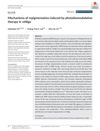 January 2018 in “Sohag Medical Journal”
January 2018 in “Sohag Medical Journal” Combining topical dutasteride with microneedling is more effective for hair growth than microneedling alone.
 December 2023 in “Frontiers in plant physiology”
December 2023 in “Frontiers in plant physiology” Root hairs are key for developing cereals that can fertilize themselves with nitrogen.
 21 citations,
January 2019 in “Experimental dermatology”
21 citations,
January 2019 in “Experimental dermatology” Light therapy using helium-neon lasers can help restore skin color in vitiligo by promoting skin cell growth and movement.
 January 2024 in “International journal of yogic, human movement and sports sciences”
January 2024 in “International journal of yogic, human movement and sports sciences” Yoga Nidra improves well-being and reduces anxiety in women with PCOS.
 66 citations,
January 2000 in “Hormone Research in Paediatrics”
66 citations,
January 2000 in “Hormone Research in Paediatrics” Androgens can both promote and prevent hair growth due to differences in gene expression in hair follicles.
 September 2023 in “F&S reports”
September 2023 in “F&S reports” PCOS may increase the risk of mental health issues like depression and anxiety.
 1 citations,
September 2016 in “Springer eBooks”
1 citations,
September 2016 in “Springer eBooks” Sebum production varies by individual and is influenced by age, gender, and hormones, affecting skin and hair health.
 2 citations,
November 2019 in “Phytotherapy Research”
2 citations,
November 2019 in “Phytotherapy Research” Pea sprout extract is safe and effectively reduces hair loss.
 December 2023 in “Migration letters”
December 2023 in “Migration letters” Herbal treatments can help manage PCOS symptoms.
 January 2025 in “Applied Sciences”
January 2025 in “Applied Sciences” Sulforaphane from broccoli may help treat certain cancers, hormone issues, and hair loss.
 9 citations,
January 2019 in “Postepy Dermatologii I Alergologii”
9 citations,
January 2019 in “Postepy Dermatologii I Alergologii” The skin acts like an endocrine organ, making hormones that affect skin diseases and respond to stress.
1 citations,
March 2021 in “F1000Research” Plant-based compounds might be effective, low-side-effect treatments for prostate cancer by blocking a specific enzyme.
 9 citations,
February 2022 in “Genes”
9 citations,
February 2022 in “Genes” Women with PCOS have more Bifidobacterium in their gut compared to those without PCOS.
 5 citations,
October 2021 in “Journal of Ovarian Research”
5 citations,
October 2021 in “Journal of Ovarian Research” Cinnamon can help manage symptoms of polycystic ovary syndrome, improve menstrual cycles and fertility, and positively affect cholesterol and blood sugar levels, but more research is needed to confirm these effects and find the best dosage.
 36 citations,
October 2021 in “Frontiers in Endocrinology”
36 citations,
October 2021 in “Frontiers in Endocrinology” Insulin resistance and high male hormone levels are major causes of Polycystic Ovary Syndrome.
 29 citations,
July 2012 in “The Journal of Sexual Medicine”
29 citations,
July 2012 in “The Journal of Sexual Medicine” Rats had lasting erectile problems after stopping a certain medication.

Different stem cells are key for hair growth and health, and understanding their regulation could help treat hair loss.
 January 2025 in “Journal of Cosmetic Dermatology”
January 2025 in “Journal of Cosmetic Dermatology” Exosomes are important for skin treatments and hair growth but need more research for safe and effective use.
 13 citations,
October 2010 in “Pharmacogenomics”
13 citations,
October 2010 in “Pharmacogenomics” Researchers found that most genes affecting drug responses are not fully covered by commercial SNP chips, suggesting the need for more comprehensive tools to optimize drug selection based on genetics.
 27 citations,
May 2019 in “American Journal of Clinical Dermatology”
27 citations,
May 2019 in “American Journal of Clinical Dermatology” Antiandrogen therapy for hidradenitis suppurativa lacks strong evidence and needs more research.
 5 citations,
June 2020 in “Journal of Endocrinological Investigation”
5 citations,
June 2020 in “Journal of Endocrinological Investigation” Women with congenital adrenal hyperplasia (CAH) have more sexual function issues than those with polycystic ovary syndrome (PCOS), but physical activity can improve sexual functioning in all women.
 August 2024 in “Archives of Women s Mental Health”
August 2024 in “Archives of Women s Mental Health” Women with PCOS have more depression and stress due to high androgen levels, not obesity or insulin resistance.
 51 citations,
November 2005 in “Journal of Medical Primatology”
51 citations,
November 2005 in “Journal of Medical Primatology” Alopecia in captive rhesus macaques is affected by season, sex, age, housing, and stress, with complex links between stress hormones and hair loss.
 19 citations,
November 2021 in “Reviews in endocrine and metabolic disorders”
19 citations,
November 2021 in “Reviews in endocrine and metabolic disorders” Sex hormones like estrogen and testosterone may affect COVID-19 severity differently in men and women, potentially influencing prevention and treatment strategies.
 59 citations,
March 2020 in “Journal of Biomedical Science”
59 citations,
March 2020 in “Journal of Biomedical Science” Understanding how hair follicle stem cells work can help find new ways to prevent hair loss and promote hair growth.
 91 citations,
April 2017 in “Diabetes & Metabolic Syndrome: Clinical Research and Reviews”
91 citations,
April 2017 in “Diabetes & Metabolic Syndrome: Clinical Research and Reviews” Eating fewer calories, less sugar and refined carbs, and more low-glycemic and omega-3 rich foods can help manage PCOS symptoms.
 4 citations,
October 2007 in “Dermatologic Clinics”
4 citations,
October 2007 in “Dermatologic Clinics” Glucocorticoids and sex hormones affect skin health, with potential for targeted treatments to minimize side effects and treat skin conditions.
 39 citations,
January 2019 in “The World Journal of Men's Health”
39 citations,
January 2019 in “The World Journal of Men's Health” Testosterone replacement therapy can prevent men from fathering children and should not be used by those wanting to stay fertile.
 10 citations,
November 2018 in “Physiological Research”
10 citations,
November 2018 in “Physiological Research” The conclusion is that standardizing testosterone measurement methods is essential for better diagnosis accuracy in women.
 197 citations,
January 2019 in “Neuropsychopharmacology”
197 citations,
January 2019 in “Neuropsychopharmacology” Male and female bodies respond differently to stress, influenced by hormones and development stages, with implications for stress-related diseases.





























